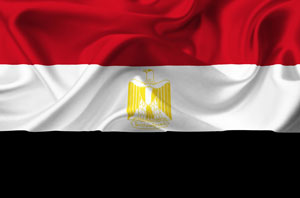Third Square movement hopes to unite Egyptians
When Defense Minister and Deputy Prime Minister Abdel Fattah El Sissi last week called on ‘loyal’ Egyptians to take to the streets to give him a mandate to confront what he called “terrorism,” tens of thousands of Egyptians rallied in major squares across the country, expressing their solidarity with the army chief they believed was acting to save Egypt from the scourge of civil war.
In Cairo’s eastern suburb of Nasr City meanwhile, thousands of Islamist supporters of deposed President Mohamed Morsi continued their sit-in outside a mosque, demanding Morsi’s re-instatement and denouncing what they describe as a “military coup against legitimacy.”
In the deeply polarized country, a seemingly unbridgeable gap between the two opposing rival camps and the intolerant attitude of you-are-either-with-us-or-against-us adopted by both Morsi’s opponents and his supporters, have left little room for neutrality. Yet, amidst the conflict and division, a third group has emerged — one whose members hope to re-unite Egyptians behind the common cause of “a free, democratic and civil Egypt.”
Made up of around 400 liberals, leftists and moderate Islamists, the so-called “Third Square” movement opposes both the military and the Muslim Brotherhood and is trying to promote a middle way amid the political turmoil, reminding Egyptians that they need to continue to work to achieve the goals of the January 2011 Revolution.
The opposition movement has adpoted the motto of “Down with all those who betrayed us: the Muslim Brotherhood, the army and Mubarak regime loyalists.” Since Islamists made sweeping gains in the 2012 parliamentary elections, the Muslim Brotherhood has often been accused by the liberal opposition of “stealing the revolution.” Meanwhile, during the transitional period when the SCAF was in power, revolutionary activists blamed the ruling military regime for the widespread human rights abuses — including the disappearance, detention and torture of hundreds of revolutionary activists — saying “the masks of the army generals running the country have dropped” and “the army and the people were never one hand.”
“The Muslim Brotherhood and the army are two faces of the same coin,” said activist/blogger Tarek Shalaby who joined the movement’s protest rally held at Sphinx Square in Cairo’s upscale neighborhood of Mohandessin last Sunday. “We neither want to be ruled by intolerant islamists whose aim is to establish a theocracy nor do we want a return to military dictatorship. ”
“No to the military junta; No to an Islamic state” and “Yes to a civil state,” read the banners raised by the activists at Sunday’s rally. The protesters also carried pictures of El Sissi and Morsi crossed out in red.
Shalaby and the other Third Square activists have used Facebook and Twitter to organize a series of protest rallies and mobilize support for their nascent movement. Posting humorous anecdotes that poke fun at the former rulers (SCAF and the Muslim Brotherhood), they also use the social media network to engage in lively discussions on the way forward for Egypt.
“We are trying to create a space where the January 2011 Revolution can stay alive and flourish. Our movement takes a firm stance against all counter-revolutionary forces . We hope to recruit more and more revolutionaries to the cause, paving the way for a political infrastructure that can lead to the democratic, civil society we aspire for,” said Shalaby.
Launched no more than a fortnight ago, the movement’s Facebook page has already attracted more than 8,300 fans and the number of followers is increasing. Yet, on the streets of Cairo, the voices of the Third Square activists are being drowned out by the cries of protesters in the two main opposing camps. Tamarod, the movement that organized the June 30 mass protests demanding Morsi’s ouster (and which now backs the interim government that replaced him) has accused the Third Square of being “counter-productive and divisive.”
“The movement is dividing the people. They are living in the past. Now is the time for consensus, we need to move forward,” Tamarod spokesman Mohamed Abdul Aziz told Voice of America. He also alleged the movement was “being led by Islamists” referring to former presidential candidate and Muslim Brotherhood member Abdel Moneim Abul Fottouh, whose Strong Egypt Party is heading the initiative.” It is a new face of the Muslim Brotherhood”, he told Daily News Egypt.
Pro-Morsi protesters camped out in Cairo’s northeastern suburb of Nasr City welcome the initiative, describing it as a “new front in the battle against military rule”.
“We welcome any movement that supports the goals of the January 2011 Revolution. It doesn’t bother us that the Third Square is against Morsi and the Muslim Brotherhood. At least they oppose the military coup”, said Amany Kamal, a radio presenter working for the Egyptian Radio and TV Union, who recently helped establish a coalition of anti-coup journalists at Rab’aa where Morsi supporters are camped out.
Skeptics however, dismiss the significance of the movement, saying it can have little impact in effecting tangible change. “The Third Square is facing two very strong, well-organized adversaries — the military and the Muslim Brotherhood. Its chances of success are slim given the fact that it is outnumbered by the rival opposing camps”, said Amina Mansour, a photo journalist who participated in the anti-Morsi protests in Tahrir Square.
However, organizers of the movement say they will not be deterred by numbers alone. “We may be starting small but we are certain our movement will grow and spread throughout the country,” insisted Shalaby.
While he acknowledged that “the Third Square does not provide practical real-world solutions to the country’s political crisis,” he says “it’s a start and one of the many roads we need to walk down if we are to come out victorious.”

